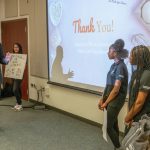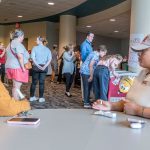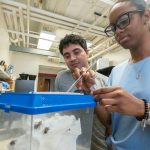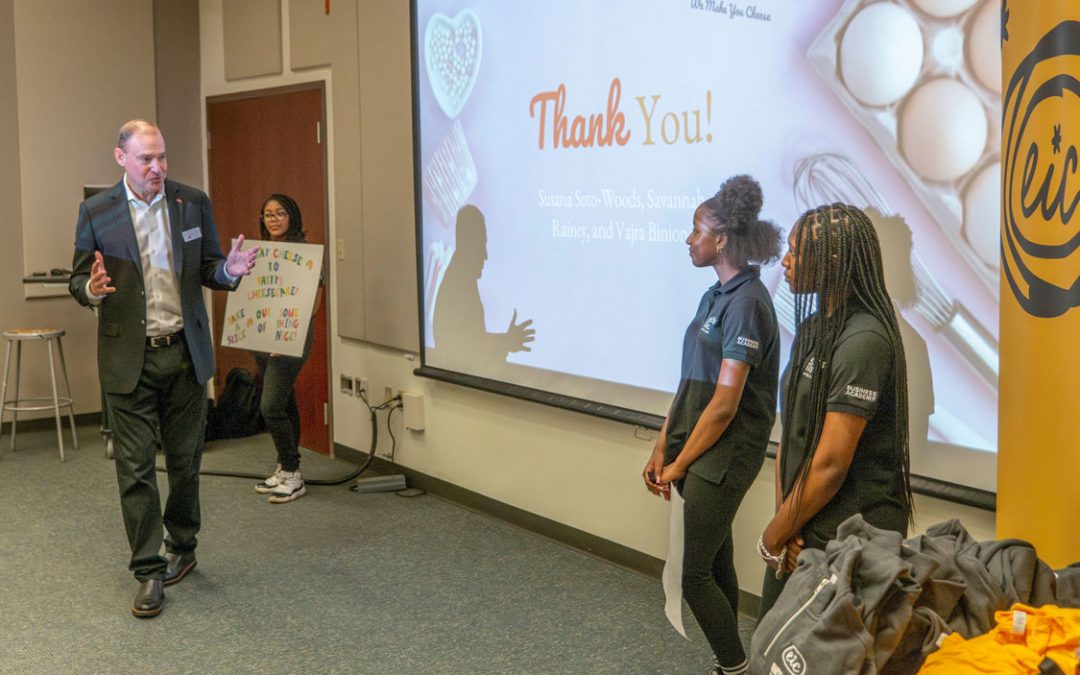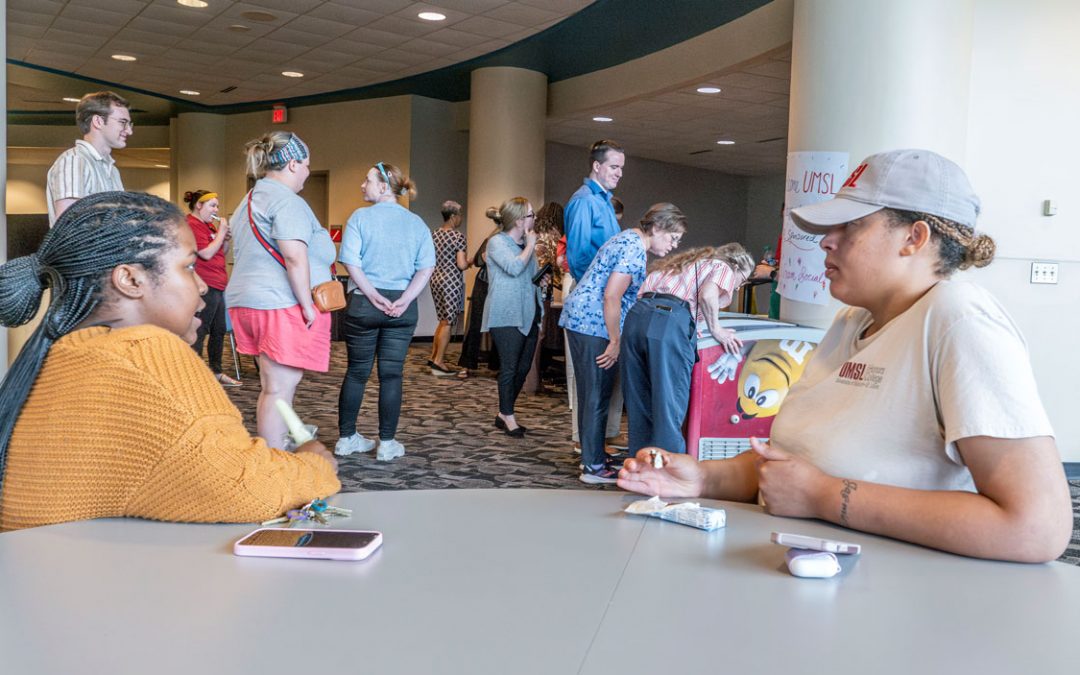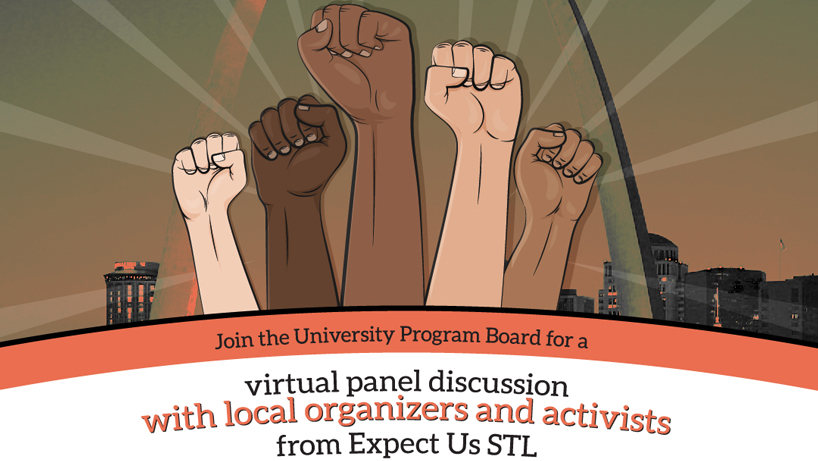
The digital panel was part of the University of Missouri–St. Louis’ Black History Month programming. Panelists Rasheen Aldridge, Ohun Ashe and Cheyenne Green touched on their history with Expect Us, the motivations behind their activism and how protests have affected change. (Screenshot)
In 2017, the acquittal of former St. Louis police officer Jason Stockley for the shooting death of Anthony Lamar Smith sparked a month-long wave of protests in the city, as many perceived the acquittal for the shooting of an unarmed Black man by a white police officer as proof of racial injustice.
Expect Us, a coalition of local activists and organizers, coordinated many of protests and was crucial to the sustained direct-action efforts, even if they didn’t quite know what to call themselves yet.
“We were just people coming together and wanting to organize,” Expect Us Organizer Ohun Ashe said. “During one of the meetings, we kept saying ‘Expect us,’ and (former Missouri State Representative) Bruce Franks is the one that said, ‘We should call ourselves Expect Us!’ It was just an ‘aha’ moment in the room. That was the perfect title for what we were doing.”
Ashe recounted the origins of the group Thursday during “A Conversation with Expect US STL!” The digital panel was part of the University of Missouri–St. Louis’ Black History Month programming and sponsored by the University Program Board.
Moderator Lynn Staley, an associate teaching professor of English and assistant director of the Gender Studies Program, led a discussion about local activism and racial injustice with Ashe, Cheyenne Green and State Representative Rasheen Aldridge, who are also part of Expect Us.
They each touched on their history with the group, the motivations behind their activism and how they’ve used protests to affect change.
Though Expect Us came together in 2017, earlier events spurred each of the panelists to fight injustice. For Ashe and Green, the shooting death of Michael Brown in 2014 was a turning point. At the time, they both lived close to the location of the shooting, and the response from the community made a lasting impact.
“Seeing people, who didn’t even know this young boy, crying and being so passionate about someone that they didn’t know, I wasn’t used to that in my community,” Green said. “Seeing people organically come together for someone they didn’t know was something that stuck with me.”
Aldridge said the disparity in resources between his neighborhood in the city and communities in St. Louis County spurred his activism and eventual entry into politics.
“What really opened up my eyes to injustice was the reality that I lived in, living in a community where I didn’t have a neighborhood park, where I didn’t have a library,” he said. “But I would go to a county school and the world was totally different.”
By the time of the Stockley trial, many local activists had connected with each other through the Ferguson protests. Ashe said people started contacting each other because they wanted to be proactive in the event of a not-guilty verdict.
When Stockley was acquitted, Expect Us was quickly able to put together protests, including several at the St. Louis Galleria. These were meant to disrupt commerce at the mall, and with profits on the line, the group reasoned people would be more likely to pay attention.
“We know that this country cares about the mighty dollar, sometimes over people,” Alridge said. “Black people are a huge impact on making this economy function, so we want to make sure we hit them in an economic way where they can feel us.”
Economic protests have been one of Expect Us’ most effective tools over the past several years. The group has also had success organizing events at the State Capitol to oppose legislation it determines will be detrimental to Black communities in Missouri.
Last summer, Expect Us’ work continued after the shooting deaths of George Floyd and Breonna Taylor by police, which caused renewed cries for police reform and an end to systemic racism. This was accompanied by one of the largest movements for racial justice in the history of the country.
Ashe said it led many people to attend a protest for the first time and take their first steps toward activism. She added that Expect Us was happy to be there for those people and tried to create a welcoming environment.
“It gives people that first step,” she said. “The experience of ‘OK, so, they’re not lying, they’re not making this up, this is happening, this is true.’ If it’s happening at this protest where we are gathering saying that Black people matter, imagine what’s happening to Black people in our communities who don’t have the support of the people around them at all times. I think that’s something else that’s very special about Expect Us, and protest work in general, that real eye-opening experience that it gives people.”
Staley wrapped up the hour-long discussion with a difficult question, asking the panelists what one concrete change they would like to see to improve the condition of Black Americans.
Given a recent NPR report that says police officers have fatally shot at least 135 unarmed Black men and women nationwide since 2015 and that 75 percent of those police officers were white, Green gave a blunt but relevant answer.
“It’s really simple for us, I think. Stop killing us,” she said. “That’s it. That’s all I want to see.”




